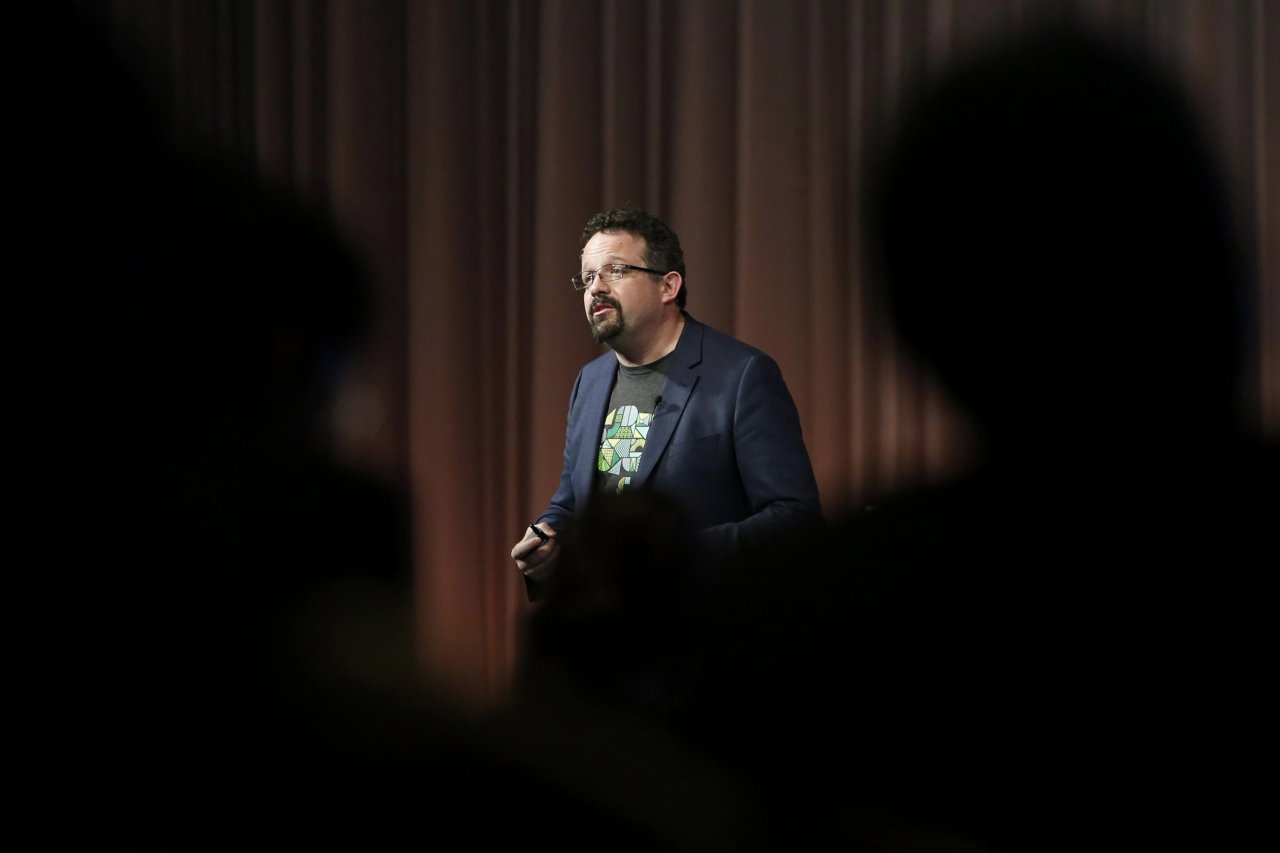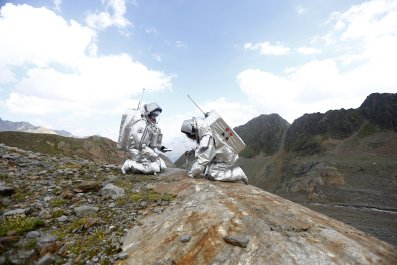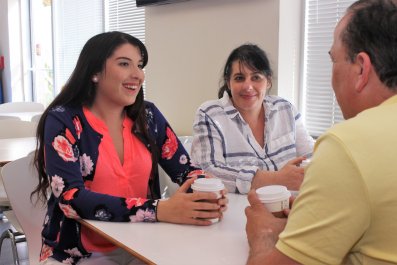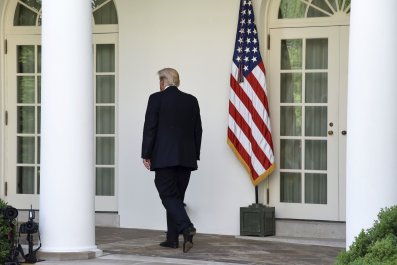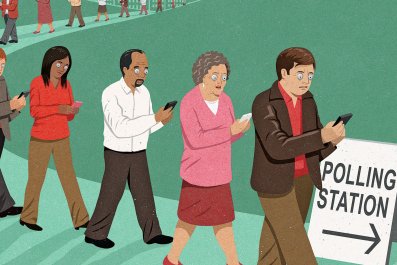A crappy cup of airplane tea and the rise of Donald Trump led to the launch in May of an outfit with the wacky name of All Turtles, which might usher in a new way to think about tech startups around the world.
The All Turtles story began with Phil Libin, who used to be CEO of the app company Evernote and lately has worked as a partner at the venture capital firm General Catalyst in Silicon Valley. Last fall, Libin boarded a JetBlue flight from Boston to San Francisco. As the plane leveled off, he ordered tea. Libin plopped the tea bag in the hot water, then got distracted for about 10 minutes. By then, the tea was over-steeped, and he had the classic problem of what to do with a soaked tea bag while trapped in an airplane seat. "I got thinking that tea is kind of a crappy experience," Libin tells Newsweek , using the type of language that usually leads people like him to think: How can I disrupt tea?
So Libin's mind wandered to how he'd fix the way the drink has been served since the invention of the tea bag in 1904. He'd find some kind of mesh material engineered to seal up after being wet for a certain amount of time, so the tea would stop steeping, and he'd attach the bag to the end of a swizzle stick that could be left in the cup. Libin concluded that to make and market such a thing would involve about 20 steps, including filing patents, working with a company like 3M on the mesh, building prototypes, seeking funding from venture capitalists and creating a whole company to carry out the idea.
Libin had no interest in disrupting the tea business, but he realized that most of the steps to do so would seem like a 100-foot wall to anyone without his experience and connections. And that led to his epiphany. "How many ideas like this exist in the world?" he says. "There are all these qualified people who understand how to fix a problem, but the world is not structured to help them make these things. So why not make a structure to do that?"
Around the same time, Trump's campaign was making it hard to ignore a deep divide in America. Silicon Valley was churning out billion-dollar companies and developing life-altering stuff, like self-driving cars and virtual reality. But huge swaths of the population have felt left behind and unable to participate. One new study by GoodCall found that 90 percent of all founders of billion-dollar tech companies attended just 3 percent of U.S. colleges—though, really, almost all the founders went to either Stanford or Harvard.
"If you're white or South Asian, male, between the ages of 22 and 27, with a computer science degree from Stanford, and if you live within 50 miles of Silicon Valley, you have a pretty good shot of getting into the tech startup ecosystem," Libin says. "For each of those things that you aren't, your odds decrease by a factor of two—or maybe 10." So much for the modern American dream in most of America.
Others around the tech industry have been realizing that opportunity has to spread to more people in more places. AOL founder Steve Case launched a "Rise of the Rest" campaign to encourage startups in cities like Memphis and Buffalo. Ro Khanna, the Democratic congressman from Silicon Valley, has been outspoken about creating tech ecosystems in places like Appalachia. Still, it's been difficult to turn somewhere that's not Silicon Valley into a hotbed of tech company creation—not even when grasping for the aura of Silicon Valley by adopting a name like Silicon Alley, Silicon Roundabout or Silicon Cow Pasture.
Libin considered this and thought that maybe the problem is the very idea of a company—forcing an inventor to start a company is like making a novelist start a publishing house. With today's technology platforms, there must be a better way. Entrepreneurs can rent cloud computing from Amazon Web Services (AWS) with a credit card or rent an instant office from WeWork. Maybe, Libin thought, someone with a good idea ought to be able to essentially rent a company to get it going.
Here's what Libin ended up with. He describes All Turtles as a studio, modeled somewhat on the way Netflix operates a studio that can handle all of a show's production and distribution so that the talent—writers, directors, actors—can just focus on creating product. Someone with a cool idea for a tech product can make a pitch to All Turtles. If that pitch is accepted, All Turtles takes care of everything that normally would come with starting a company. The innovator just has to focus on bringing the cool idea to life. All Turtles includes physical work space and wants to foster interaction and a sense of community among its members.
As for a payoff, the innovator gets equity in his or her venture, as well as some equity in the All Turtles pool of projects. "Call it a fellowship," Libin says. He hopes that once a member gets one product into the market, that person will stay in All Turtles and start something else. Just because you invent something, Libin notes, doesn't mean you should have to be stuck for years with a company you started around that invention. This allows innovators to move on and keep inventing.
In this sense, All Turtles is a meta-company, and all its members are self-directed, entrepreneurial contributors free from having to raise money, coddle investors, muck around with legal issues or figure out what kind of kale salad to include in the catered lunch.
The ultimate big idea is to put these All Turtles outlets all over the world to capture ideas Silicon Valley would miss from people who are not white, male Stanford grads—and to help transform economies in places like Memphis and Buffalo. OK, so one of the first three All Turtles has been set up in San Francisco, which defeats the purpose. The others are in Tokyo and Paris. But Libin plans to roll them out to many, many cities, connecting them all in a global All Turtles cloud network.
Much more than disrupting tea, Libin is after a bigger prize. "We think we can disrupt the idea of a company."
And the name? It comes from the existential expression "turtles all the way down"—the ancient idea that the world is flat and is supported on the back of a giant turtle. But what supports the giant turtle? Another turtle. In fact, it's turtles all the way down. Similarly, All Turtles is supposed to be a platform for new ideas, which sits on top of cloud platforms like AWS, which in turn sits on platforms like the internet, which in turn rides on routers and fiber optics…and so on. It's platforms all the way down.
That might sound a little woo-woo, but coming from a Silicon Valley VC, at least the concept for once doesn't put Silicon Valley at the center of the universe.



